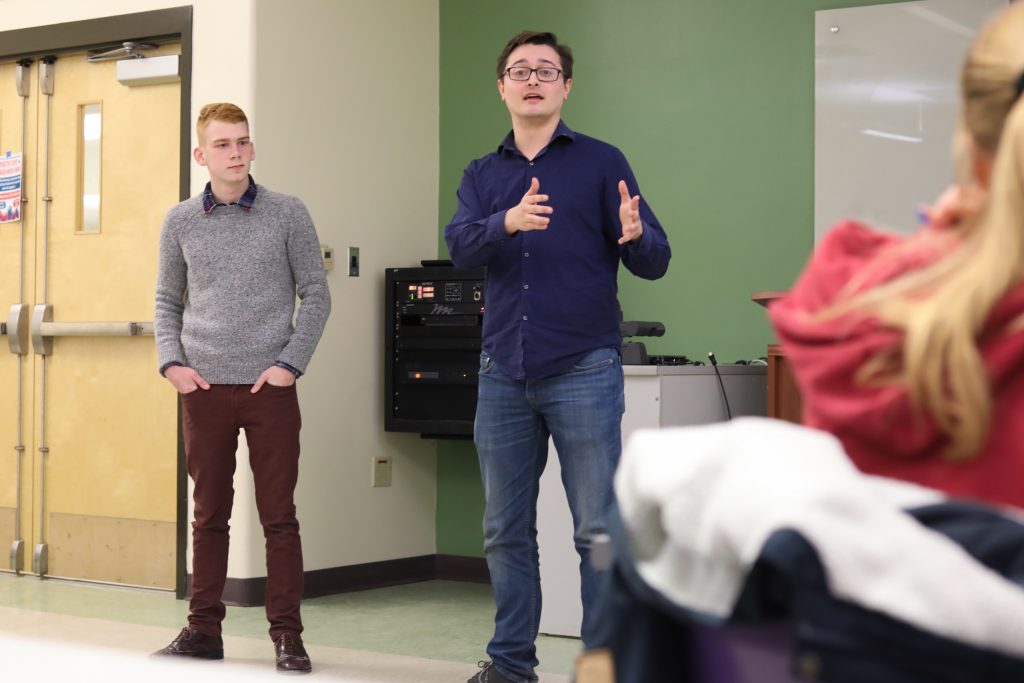For Benjamin Reynolds, 19, and Conrad Taylor, 22, it’s never too early to become involved in politics. The two visited Binghamton University on Monday to encourage students to become more politically engaged.
Reynolds, the youngest elected official in New York state, a village trustee in Johnson City and a freshman at SUNY Oneonta, and Taylor, ‘17, a Binghamton City Council member elected while attending BU, spoke at Youth Civic Engagement Night, which was hosted by March For Our Lives (MFOL) BU and Generation Vote.
The event featured a Q&A during which Reynolds and Taylor answered various questions from attendees regarding their journeys to significant political involvement at young ages. They also offered advice to students looking to become more politically involved in their community, such as working closely with local voters and staying in contact with constituents.
Bennett Owens, co-director of BU’s chapter of MFOL and a freshman majoring in political science, said organizers specifically reached out to Reynolds and Taylor because of their comparable political goals and ideologies.
“Their involvement in politics at such a young age is something that March For Our Lives BU wants to highlight as vital to democracy,” Owens wrote in an email.
During the Q&A, Taylor highlighted the importance of voting, which he said is one of the easiest and most important ways college students can participate in politics.
“If you don’t vote, as bad as it sounds, politicians aren’t going to hear you, because you don’t vote and they don’t need you,” Taylor said. “That’s just how politics works in a lot of cases. They’re going to listen to the people that are voting.”
However, Taylor and Reynolds noted that students can also devote their efforts to campaigning and canvassing for candidates. According to Reynolds, knocking on doors is a critical way for young activists to be engaged in the political process.
“If you can get out there and knock on doors and talk to people and just hand a piece of literature to a voter, that is helping out, and that is being engaged in the political process,” Reynolds said.
Both Reynolds and Taylor emphasized the importance of the work BU political student organizations continue doing both on campus and throughout the greater Binghamton area.
“The work that you guys are doing to actually be engaged with us, be engaged in the community, be engaged in the issues you care about — that’s a huge thing,” Reynolds said.
According to Reynolds, the more students become politically involved, the more student-focused development and progress they can expect to see in Johnson City and Downtown Binghamton. Reynolds said he hopes to see increased student housing and storefront development in Johnson City as a result of BU’s new health sciences campus. Meanwhile, Taylor is working toward establishing green initiatives in Binghamton, such as electric vehicle charging stations, solar powered projects and the addition of a “green roof” to the Binghamton City Hall.
“Events like these are important because they make politicians and local politics accessible to young people,” Owens wrote. “What I hope that students will take away from this event is that no matter how young you are, you can make a difference in American politics. Whether it be through voting, protesting or even running for office yourself, young people have the ability to shape this nation’s future.”
Chloe Levine, a member of MFOL and a freshman majoring in linguistics, said she’s a firm believer in students taking small steps to become more involved in politics.
“Now, more than ever, we need the younger generation’s voices to be heard,” Levine said. “And it starts small by joining something as simple as our club or the many other political clubs on campus. Politics affects everyone, so why not try to be involved in it as much as you can?”



